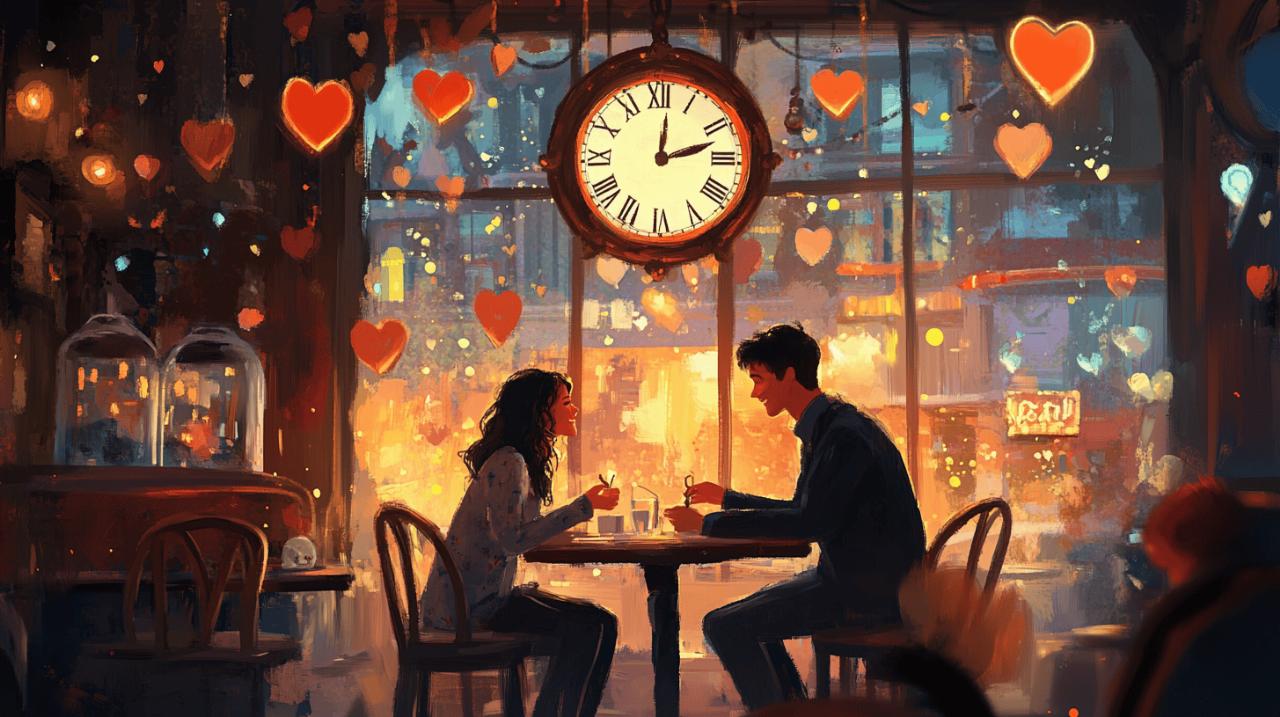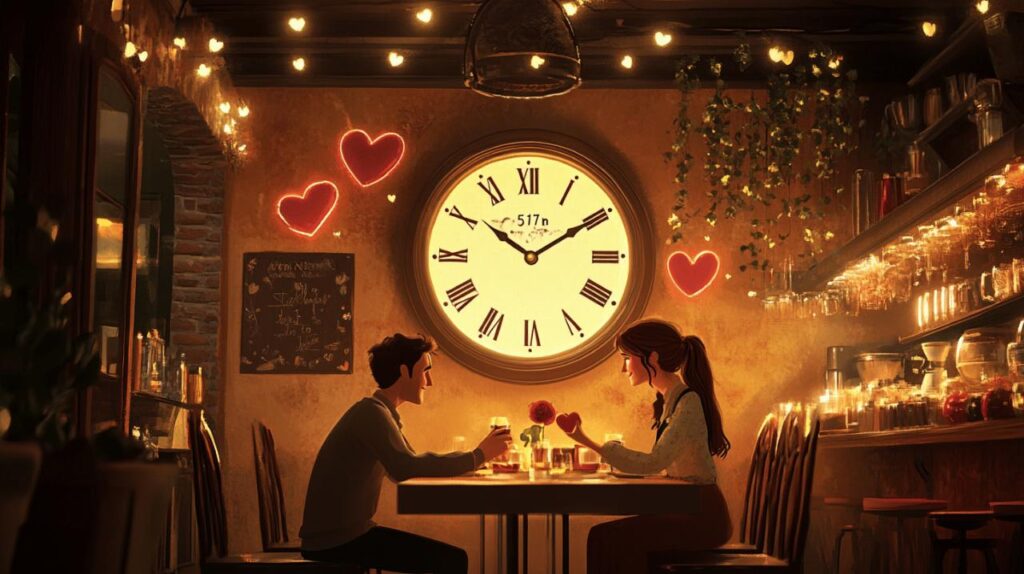There exists a peculiar enchantment in the moments when daylight begins its slow retreat and the evening gently announces its arrival. It is during these transitional hours, particularly around the time when clocks point to 5:17pm, that love seems to acquire a different texture, a renewed vibrancy that defies the ordinary rhythms of our daily existence. This fleeting window between the demands of the day and the promise of night holds a unique power to reshape how we perceive connection, intimacy, and the possibilities that relationships offer.
The golden hour psychology: understanding 5:17pm's emotional resonance
Late afternoon carries with it a subtle shift in our emotional landscape, a transformation that often goes unnoticed yet profoundly influences how we relate to those closest to us. The quality of light during this period, neither harsh nor fully subdued, creates an atmosphere that softens edges and invites introspection. Psychologists have long observed that transitions in natural light affect our mood and cognitive processes, and the gentle descent into evening is no exception. This time of day offers a respite from the relentless pace of work and obligation, allowing our minds to wander toward more personal territories, including thoughts of romance and connection.
Why late afternoon transforms our romantic perceptions
The phenomenon of 5:17pm as a moment of romantic transformation is not merely poetic fancy but rooted in the very structure of our daily lives. As the working day draws to a close, our minds begin to shift from professional concerns to personal aspirations. This cognitive transition opens a space where vulnerability becomes more accessible, where the barriers we maintain during daylight hours start to lower. The anticipation of evening brings with it a sense of possibility, a feeling that the hours ahead belong to us rather than to employers, schedules, or external demands. In this liminal space, love finds fertile ground to flourish, as we become more receptive to emotional engagement and less guarded in our interactions.
The science behind twilight's effect on human connection
Research into circadian rhythms and emotional regulation reveals that our capacity for empathy and social bonding fluctuates throughout the day. The late afternoon period coincides with a natural dip in cortisol levels, the hormone associated with stress, which in turn makes us more emotionally available. This physiological shift is complemented by the symbolic weight that twilight carries in human consciousness. Across cultures and throughout history, the threshold between day and night has been imbued with meaning, representing transformation, mystery, and the blurring of boundaries. When we experience love at 5:17pm, we are not only responding to biological cues but also tapping into a deep well of cultural and psychological associations that link this time of day with heightened emotional states.
Love at 5:17pm: When the Day Meets Possibility
The beauty of this particular hour lies in its position as a bridge between two distinct phases of existence. On one side stands the structured, public self that navigates professional responsibilities and social obligations. On the other awaits the private, intimate self that emerges when the demands of the day recede. Love experienced at 5:17pm benefits from this duality, drawing energy from both the accomplishment of the day completed and the anticipation of the evening yet to unfold.
The Transition from Work to Personal Life and Its Impact on Relationships
Understanding the significance of this transition requires acknowledging how thoroughly modern life separates our professional and personal identities. For many people, the journey home from work or the moment of logging off from remote duties represents more than a change of location or activity. It signifies a return to one's authentic self, a shedding of the roles and personas that the working world demands. When couples reconnect at this hour, they meet each other in this state of transition, still carrying traces of their public selves while beginning to reveal their more vulnerable, private aspects. This dynamic creates a unique opportunity for intimacy, as partners witness and support each other through the daily ritual of transformation from professional to personal identity.
Creating Meaningful Moments in the Space Between Day and Night
The promise of evening invites us to be intentional about how we use these precious hours. Rather than allowing the transition from work to home to pass unnoticed, couples who recognize the magic of 5:17pm can transform it into a ritual of reconnection. This might involve a shared cup of tea, a walk through the neighbourhood as the light softens, or simply sitting together in comfortable silence while the day's tensions dissolve. The key lies in acknowledging the significance of this moment, in treating it not as mere downtime but as an opportunity to nurture the emotional bonds that sustain relationships through the more challenging periods of life.
Cultural significance of evening romance across britain
 British culture has long held a particular affection for the rituals of evening, from the tradition of afternoon tea extending into early evening to the pub culture that flourishes as daylight fades. These customs reflect a collective understanding that the transition into night deserves its own ceremonies, its own spaces for connection and conversation. The appreciation for twilight moments is woven into the fabric of British social life, creating a context in which the romance of 5:17pm finds ready acceptance and expression.
British culture has long held a particular affection for the rituals of evening, from the tradition of afternoon tea extending into early evening to the pub culture that flourishes as daylight fades. These customs reflect a collective understanding that the transition into night deserves its own ceremonies, its own spaces for connection and conversation. The appreciation for twilight moments is woven into the fabric of British social life, creating a context in which the romance of 5:17pm finds ready acceptance and expression.
British Dating Traditions and the Allure of Early Evening Encounters
The practice of early evening dates has deep roots in British courting traditions, where meeting for drinks or a meal as darkness approaches allowed for a balance between propriety and possibility. Unlike midday encounters, which carry an air of casual friendship, or late-night rendezvous, which might seem too forward, the early evening offered a middle ground where romantic interest could be explored without undue pressure. This timing remains popular today, as it provides a natural framework for dates that can either conclude gracefully after a few hours or extend into the night if mutual interest warrants. The cultural acceptance of this timing reinforces the idea that there is something inherently romantic about the hour when day yields to evening.
How the Promise of Evening Shapes Our Understanding of Intimacy
Intimacy requires time, patience, and the absence of distraction, all of which the evening hours potentially provide. When we speak of the promise of evening, we acknowledge that these hours hold the potential for deeper connection than the rushed interactions of daytime allow. The softening light, the quieting of urban noise, the gradual withdrawal from public spaces into private ones, all these elements contribute to an atmosphere conducive to emotional openness. Couples who consciously cultivate their connection during these hours often report feeling more attuned to each other, more willing to share vulnerabilities and dreams than they might be during the harsher light and pace of daytime.
Practical Ways to Embrace the 5:17pm Magic in Your Love Life
Recognizing the unique quality of this time is one thing, but actively incorporating its magic into your relationship requires intentionality and creativity. The challenge lies in resisting the temptation to let these hours slip away in passive consumption of media or the mindless completion of household tasks. Instead, couples can design practices that honour the transitional nature of this time and harness its potential for deepening their bond.
Designing evening rituals that strengthen romantic bonds
Rituals need not be elaborate to be effective. The simple act of greeting your partner with full attention when they arrive home, asking about their day not as a formality but with genuine interest, can transform an ordinary evening into an opportunity for connection. Some couples establish a practice of sharing a specific beverage at this hour, creating a marker that signals the shift from work mode to relationship mode. Others might take a brief walk together, using the movement and changing scenery to facilitate conversation and release the tensions accumulated during the day. The specific content of the ritual matters less than its consistency and the intention behind it, the commitment to prioritizing connection during these precious minutes when the world pauses between day and night.
Making the Most of Twilight Hours for Deeper Connections
Depth in relationships comes from sustained attention and the willingness to move beyond surface interactions. The twilight hours offer ideal conditions for such depth, as the approaching darkness creates a natural sense of enclosure and intimacy. Couples might use this time to discuss not just the logistics of daily life but their hopes, fears, and dreams. The slight melancholy that often accompanies dusk can actually facilitate more honest conversation, as the poignancy of time passing makes us more willing to speak truth and less inclined to maintain pretenses. By consistently dedicating this time to meaningful interaction rather than distraction, partners build a reservoir of emotional connection that sustains them through the inevitable challenges and mundane stretches that characterize long-term relationships. The magic of 5:17pm, ultimately, lies not in the time itself but in our willingness to recognize and honour the unique possibilities it offers for nurturing love in all its complexity and beauty.

